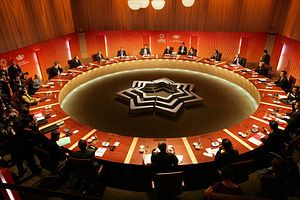Chinese President Xi Jinping’s visit to Mongolia this week is creating expectation that significant trade deals are likely. Both sides need something. Mongolia needs more investment in its non-agricultural industries (particularly mining) as well as access to foreign markets via Chinese rail. That Xi’s visit to Mongolia is a stand-alone excursion rather than a multi-country tour shows how important this visit is to Beijing, and what it may possibly hope to accomplish in November.
While Mongolia remains worried about Beijing’s dominance of its economy, which accounts for 90 percent of its exports (mainly in coal and copper), it has little choice, with most export markets requiring at least transit through China. Bilateral trade has expanded from $324 million in 2002 to almost $6 billion in 2013, and Xi has proposed increasing it to $10 billion by 2020, according to Xinhua. As Mongolia’s economic growth has slowed from 11.7 percent in 2013 to 5.3 percent in the first six months of 2014, it may be persuaded to allow greater Chinese investment in the mining sector, despite previously blocking deals to buy large stakes in companies like mining firm SouthGobi Resources. Mongolia also needs investment in infrastructure, and its official policy seeks to balance Chinese and Russian interests with “third neighbors.” According to senior analyst Neil Ashdown at IHS Country Risk, a rail transit agreement is the most likely outcome of Xi’s current visit, as this would satisfy Mongolia’s needs for infrastructure while further attaching it to Chinese markets.
Aside from the economic benefits of increased trade, Xi is also looking to make this meeting a showcase of how doing business with China will “promote stable relations with neighboring countries and bolster China’s influence,” according to the Nikkei Asian Review. Despite declaring this to be his policy last fall, territorial disputes in the East China Sea and South China Sea with most of its maritime neighbors have created a regional backlash against China.
However, Xi now appears interested in mending some of those ties, particularly before playing host to many of these countries at this November’s APEC summit. Japan has already expressed an interest in improving relations, with Prime Minister Shinzo Abe repeatedly requesting a summit with Xi. China may also be ready to temporarily thaw ties, as it allowed its foreign minister to meet his counterpart at the most recent ASEAN summit in Myanmar, and Xi reportedly expressed interest in better relations after quietly meeting former Japanese Prime Minister Yasuo Fukuda last month. Countries like Vietnam and the Philippines will likely require more incentives and indications of cooperation over territorial issues before relations warm with China. As yet, it remains to be seen what China will do beyond checkbook diplomacy to reduce tension.































